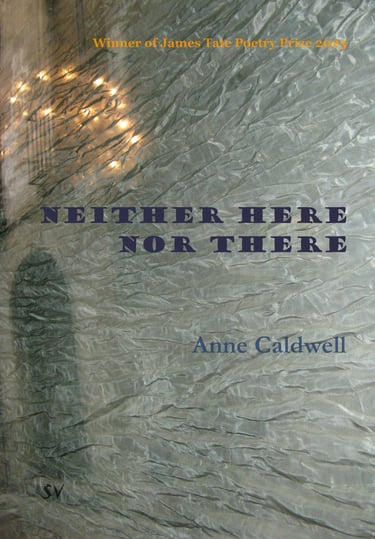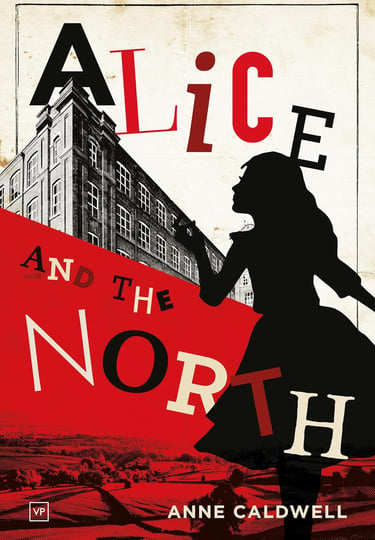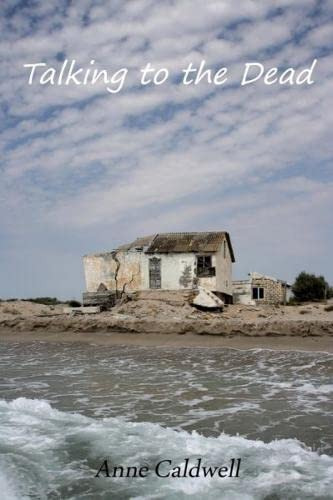Anne Caldwell has published four previous collections of work prior to The Language of Now: Alice and the North, (Valley Press) Slug Language (Happenstance), Talking with the Dead and Painting the Spiral Staircase (Cinnamon Press). She also co-edited The Valley Press Anthology of Prose Poetry (Valley Press) with Oz Hardwick and Prose Poetry in Theory and Practice, a collection of essays for Routledge in 2023. There is a growing audience for prose poetry in the UK, and it is a genre that is receiving much attention in the contemporary poetry world through the advocacy of international writers.
Her latest collection is 'The Language of Now', Valley Press, Spring 2026. ‘T‘The Language of Now is a book of interconnected rooms which explore with passion, humanity, humour and resonant imagery the vulnerability of everything we might have once thought fixed. Caldwell holds the disquiet of nighttime thoughts still enough to see, while the year’s wheel falters on its axis, glaciers melt, bogs grow parched, and bodies fail. These expertly crafted and often deeply personal prose poems will occupy my head for a long time’. Helen Ivory
This collection is firmly rooted in a northern sense of place and eco-poetics, as well as an exploration of the turbulence of illness and climate change. Prose poetry is brilliant at holding contradictions and juxtapositions: qualities that are exploited in a search for an intimate relationship with the natural world.
Caldwell explores childhood memories, the fragility of landscapes both rural and urban, and the impact of the pandemic, where our connection to each other was fragmented and stretched. The prose poems combine the real and the fairytale, memoir and myth, where humans transform into birds and language is lost and found. She sees poems as small acts of resistance.
he‘The Language of Now is a book of interconnected rooms which explore with passion, humanity, humour and resonant imagery the vulnerability of everything we might have once thought fixed. Caldwell holds the disquiet of nighttime thoughts still enough to see, while the year’s wheel falters on its axis, glaciers melt, bogs grow parched, and bodies fail. These expertly crafted and often deeply personal prose poems will occupy my head for a long time’. Helen Ivory
This collection is firmly rooted in a northern sense of place and eco-poetics, as well as an exploration of the turbulence of illness and climate change. Prose poetry is brilliant at holding contradictions and juxtapositions: qualities that are exploited in a search for an intimate relationship with the natural world.
Caldwell explores childhood memories, the fragility of landscapes both rural and urban, and the impact of the pandemic, where our connection to each other was fragmented and stretched. The prose poems combine the real and the fairytale, memoir and myth, where humans transform into birds and language is lost and found. She sees poems as small acts of resistance.
Language of Now is a book of interconnected rooms which explore with passion, humanity, humour and resonant imagery the vulnerability of everything we might have once thought fixed. Caldwell holds the disquiet of nighttime thoughts still enough to see, while the year’s wheel falters on its axis, glaciers melt, bogs grow parched, and bodies fail. These expertly crafted and often deeply personal prose poems will occupy my head for a long time’. Helen Ivory
This collection is firmly rooted in a northern sense of place and eco-poetics, as well as an exploration of the turbulence of illness and climate change. Prose poetry is brilliant at holding contradictions and juxtapositions: qualities that are exploited in a search for an intimate relationship with the natural world.
Caldwell explores childhood memories, the fragility of landscapes both rural and urban, and the impact of the pandemic, where our connection to each other was fragmented and stretched. The prose poems combine the real and the fairytale, memoir and myth, where humans transform into birds and language is lost and found. She sees poems as small acts of resistance.
Aqueduct
Walls were less rigid when I was young. Bedrooms expanded when love bloomed and contracted as grief swallowed the family, made it lemon-sour and pithy. Hiding in the bottom of the wardrobe, I would listen to the bitterness of mother and father. I’d a penknife, a lucky stone and a ball of string.
I owned a hand-me-down bike and found a cycle route to Astbury, cutting beneath the canal aqueduct. The air was damp and cool; the brickwork smothered in moss.
A stalactite childhood lay here, lingering beneath that body of water. Beneath tadpoles and crested newts; beneath rusty shopping trollies and lead fishing sinkers.
From Neither Here Nor There, SurVision, 2024
Rust and Nettles
Down, down, down. Would the fall never come to an end?
—Lewis Carroll, Alice’s Adventures in Wonderland
Alice and her sisters are fat from eating mulberries, blackberries, sloes and grassy, bitter damsons. Fingertips and lips stain purple. Their Tupperwares leak trails of juice. Boundary Lane is billowing with cow parsley. The girls feel like they’re carrying a dismembered body home. Alice is reading Little Women and The Hobbit. The season is on the cusp. At night, they sleep closer together: four sisters blowsy with heat and sunburnt shoulders. They’re skinny as wild cats, calloused from wandering barefoot. Soon Alice will slip on borrowed stilettos, smear her cheeks with rouge and the map of Wonderland will be gone forever. Her mother sterilises Kilner jars in the oven, purses her lips. She fills a larder with the summer’s glut, slow-cooks meringue, brittle with love. It can happen in an instant, she says, darkly. Alice has some idea of what this means.
Congleton
The cul-de-sac is quiet. Gangs of distant roller-skaters trundle up and down the empty roads beyond. Alice grows in a bowl of wild-faced children. A rocket-shaped figure lurks in the ice-cream van with his deadnettle promises of Pyrex riches. He tells Alice to sit still on his lolly.
And down the lane lives Mr Riches the PE teacher who downs whisky, then lets his practised root hang loose and wet in his pants. Skin tight. Living purple. His girls run up and down the hockey pitch, bruising each other’s ankles mauve.
In the distance, on the M6, goods lorries long to nuzzle, limp home as the motorway bridge hangs its head, pollen yellow. Alice decides she’s a horse in a field. The grass is boggy with silver birch.
Incubating Twins
She strokes their stomachs with her forefinger.
Tomorrow or the next day,
their small sarcophagi will be opened forever.
She will hold their wee bodies to the sun,
breathe their scent, like freshly-cut hay.
Breast-milk stains her blue silk gown.
Robert screams when she has to go home.
She carries his cry like a wren in her pocket.
Feels the sharp beak of it.
Throughout the night, she sings to them
across the streets of Lewisham.
From Talking with the Dead, Cinnamon Press, 2011 and first published in The North







